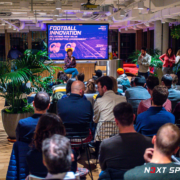Thanks to technological breakthroughs, we are going through extremely interesting and novel dynamics in the sports industry that we have never seen before. Technological change is accelerating at an astonishing rate, and in just a few years, we have seen some great strides and it’s increasingly clear that teams and leagues can no longer be reactive to today’s models, but have to play an active role at the forefront of developing tomorrow’s.” With these words, N3XT Sports CEO Mounir Zok welcomed participants to the inaugural Kosmos Sports Summit presented by Rakuten and LaLiga. As the official master of ceremonies for the day, Mounir set the stage for a prominent lineup of speakers that shed light on many topics throughout the day.
With the active participation of Gerard Piqué, Founder, CEO, President, and Chairman of the Board of Directors of Kosmos, Javier Tebas, president of LaLiga, and Rahul Kadavakolu, Executive Director of the Global Marketing Supervisory Department and Vice President of Sports Business at Rakuten, Inc, the opening panel took the long view, discussing what the sports industry could look like in 2030! Other sessions covered insights from Nielsen Sports and a panel discussion around football innovation.
Our 3 takeaways from the inaugural Kosmos Sports Summit are that:
1. Data is key to offer personalized content
As spectators and consumers are accessing content through multiple channels, it is important to deliver content where and when they want. We learned of Laliga’s approach to this topic. They have a department dedicated to the collection, analysis, and generation of insights called the Business Intelligence Department. Their mandate is to centralize, order, and prepare data in order to optimize resources and make better decisions in the future. With data becoming increasingly important and complex, organizations must leverage a data strategy to ensure their fans are serviced in the best way.
2. It is not just about a sport, it is about ENTERTAINMENT
Following on this year’s 4YFN panel that N3XT Sports delivered, titled Sportainment, the attendees underlined the importance of mixing sport and entertainment. With competing forces in the attention economy, successful sports entities in the future need to think about how they are complementing their core products with wider options of engagement.
3. An innovative culture internally leads to sustainable competitive advantage
For an organisation to remain competitive it must continuously improve its innovation capability. This is best served or fostering a culture of innovation within an organisation. In doing so, a culture of collaboration, agility, and experimentation is generated, which will sustain innovation efforts over time. One of the best ways to do that is by developing the right skills in each and every person. Implementing an intrapreneurship program within could be considered the most resource-intensive and slowest mechanism to yield tangible results. Done properly, however, the results can be astonishing.
Thank you to the teams at Kosmos Tennis, Laliga, Rakuten, and all the guest speakers and participants, who contributed to the success of the event. Tune in to our social media channels to keep your finger on the pulse.



